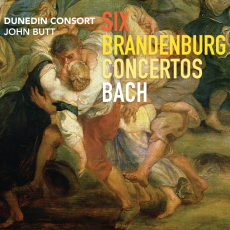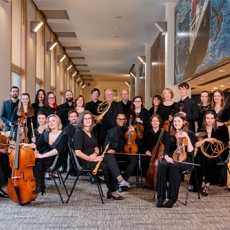Dunedin Consort - J.S. Bach: Six Brandenburg Concertos - BBC Radio 3 'CD Review'
Andrew McGregor with Simon Heighes
AM: ‘...the new set from John Butt and the Dunedin Consort. Such a lot of Brandenburgian-competition on record. Is there something new or different or better to say, or is that not the point?'
SH: ‘Hmm, well with Bach I think that there's probably always something new to say. But I don't like this sense that every time a new version comes out you're looking at "oh what's new about it" and you go through listening for those moments that light up. But there are a few here actually, and one of them is that we know that Bach at Cöthen where they were probably written, probably had an orchestra which would have offered one performer per part. And that's pretty much what John Butt does - that's fine. And unlike Kuijken who thinks you shouldn't double the bass line an octave down with the violone or double bass, John Butt actually disagrees, so we actually have quite a rich bass line for these Brandenburgs. And he adds a violone grosso to his bass. So there are some tremendously rich passages, especially actually in the slow movement to Brandenburg Four, a wonderfully Corelli inspired movement this, where the usual dialogue between soloists and orchestra is one of dynamics. The orchestra played loudly, the soloists softly, but they share the same sort of material. It can be difficult to give a movement like this a sense of momentum and drive because there's so much echoing, but I think the Dunedin Consort do very well and very richly.'
Track
AM: ‘...the richness, we were talking about the doubling with the violone. I think sometimes people don't understand how low that instrument is; it is a double bass equivalent or lower.'
SH: ‘Yes that's right. It plays an octave, so at 16 f pitch, below the notated bass parts. So yeah, it's a very low instrument. Not quite as think and rich, with such big strings as a double bass, they are gut strings, smaller, but it's still very rich and low.'
AM: ‘I was wondering whether we should make a point about Italian excitement versus British materfact after the Avison Ensemble's Corelli earlier. There's something about this set of performances; we've taken a step away from some of those excitable Baroque ensembles and the Italians who've recorded Bach's Brandenburgs at breakneck speed often. I think I'm enjoying it.'
SH: ‘It's very interesting. There's a British way of doing Bach, there's no doubt about it. I mean, on a good day it sounds wonderfully thoughtful, and all of the parts have been teased out; on a rainy day it can sound a bit dull. And I must say I do like what the Italians do to Bach sometimes...John Butt is good because he brings a Germanic seriousness to the music as well, the rhetoric of it. If the Italians see the drama, the Germans see the rhetoric in the music and the British see all of that wonderful contrapuntal detail.'
AM: ‘It's just so nicely integrated, isn't it? It's an A-list of players, it really is. But chamber ensemble, you don't get people stepping forward, not even the trumpeter, Mr. Blackadder, in the second Brandenburg Concerto. It's all beautifully integrated.'
SH: ‘That's another thing about British Bach, its team-play. Definitely.'
AM: 'The richness that we heard, it's not just the recording, its not just the violone, it's the pitch as well, isn't it?'
SH: ‘That's right. This is the major new novelty of this recording, John Butt argues that if the Brandenburgs were originally performed during Bach's time at the court of Cöthen, they will probably have been played at the slightly lower pitch favoured there, which is about a tone below modern concert pitch. That's about a semi-tone below the standard Baroque pitch. Of course there was no standard Baroque pitch, it's all pretty approximate, but by taking things down a tone from modern pitch, John Butt says we can appreciate the music in subtly didn't ways. He says the lower pitch encourages slightly slower, but more subtle articulation from the instruments. And I think we just heard that very clearly. And in Brandenburg 2 the way that the trumpet integrates with the ensemble may be because it's at a slightly lower pitch. But for me I think the biggest benefit of the lower pitch is the greater warmth and glow it brings to the brass, particularly in Brandenburg 1.'
Track
AM: ‘Lovely, rich, well integrated brass sounds in the first Bach Brandenburg Concerto with the Dunedin Consort and John Butt on Linn Records. Simon Heighes, I think we need this, don't we?'
SH: ‘We do. We really do. They're not flash, but they feel like family. There's a sort of cohesiveness to the playing, they're friendly, you want to have them on. They're not rushing for your attention, not trying to grab it, but slowly it seeps in. One of the things I think they do extremely well is tease out so much of the delicate part writing, the contrapuntal interest. And Linn Records' recording is splendid. I mean really beautifully, beautifully translucent almost.'
AM: ‘It works very well indeed, doesn't it? It matches the richness of the sound.'

